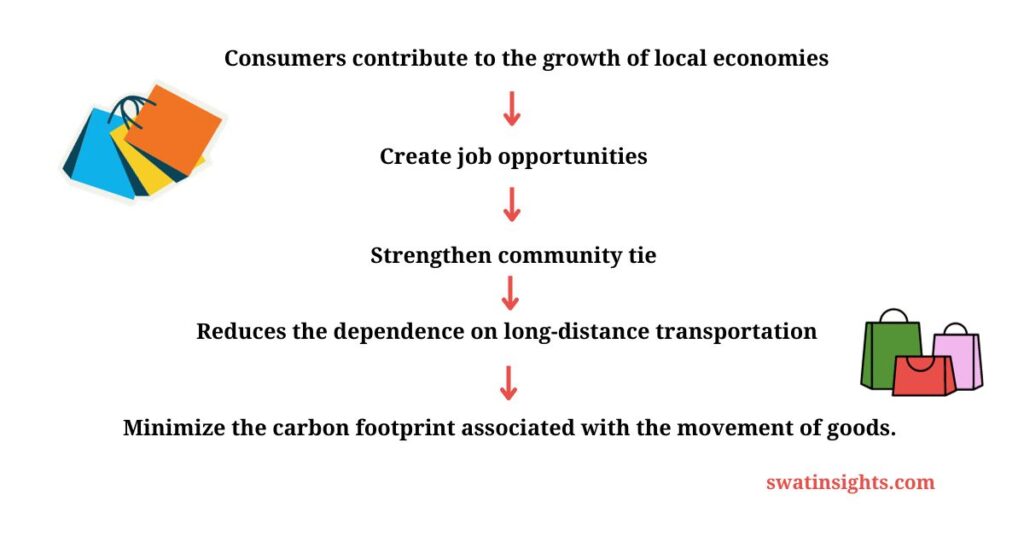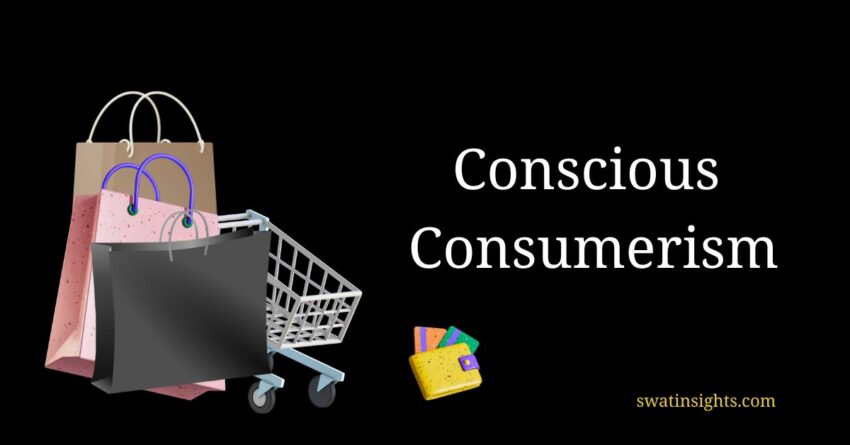In recent years, a significant shift has occurred in consumer behavior. People have become aware of their impact on the world.
It is reflected in their purchasing decisions as well. This new trend is known as conscious consumerism.
A shopaholic loves to shop a lot. They might not need the things that they are purchasing.
Eliminating those reasons of consumerism is Conscious consumerism.
Conscious consumerism is making deliberate and thoughtful purchasing choices that depend upon our personal and ethical values.
Therefore, Conscious consumerism encourages the adoption of Eco-friendly and sustainable alternatives.
Beyond environmental concerns, this consumerism also addresses social issues.
Different names of Conscious consumerism are:
- ethical consumerism,
- responsible consumerism,
- green consumption.
- Why Conscious Consumerism is important?
- 1. Reducing Carbon Footprint:
- 2. Renewable resources:
- 3. Promoting Sustainable Innovation:
- 4. Ethical Production and Fair Labor Practices:
- 5. Supporting Local Artisans:
- 6. Quality Over Quantity
- 7. Financial Savings
- 8. Transparency
- 9. Health and Well-being
- 10. Community Building
- 11. Educational Aspect
- 12. Mindful Purchasing Habits
- 13. Encouraging a Circular Economy
- 14. Leading by Example
- Conclusion:
Why Conscious Consumerism is important?
1. Reducing Carbon Footprint:
Purchasing from local stores reduces the necessity for long-distance transportation. It leads to a reduction in carbon emissions.
2. Renewable resources:
When you choose products made from renewable resources, you’re helping our planet by reducing the pressure on its limited resources.
3. Promoting Sustainable Innovation:
As consumers demand more Eco-friendly products, companies invest more in research to meet these demands.
It can lead to global changes and the development of environmentally friendly products.
4. Ethical Production and Fair Labor Practices:
Conscious consumers support fair and ethical working conditions for laborers.
Therefore, they choose companies that follow fair labor practices, resulting in better wages and safer working conditions for workers.
How Globalization Affects Consumerism?
5. Supporting Local Artisans:

This consumerism promotes buying locally and supporting small businesses, which supports local sellers and artisans by purchasing their products.
6. Quality Over Quantity
Choosing reliable and quality products is a wise approach when making purchasing decisions.
It not only ensures longevity but also contributes to overall satisfaction and sustainability.
Minimalism vs. Consumerism: Which One Leads to a Better Life?
7. Financial Savings
While quality products may sometimes be costlier upfront, they often save money in the long run as they require less frequent replacement.
Social media sometimes blurs the line between needs and wants. Every scroll brings new trends and new things to buy.
How does Social media affects Consumerism: Reasons and Results
8. Transparency
It’s our duty as consumers to understand where and how products are made.
This awareness helps us make informed choices and encourages businesses to be more transparent and responsible in their practices, ultimately benefiting everyone.
Remember, trust is built upon transparency.
9. Health and Well-being
Conscious consumers prioritize personal health and well-being by choosing products free from harmful chemicals.
This decision keeps them healthy and also makes the environment safer for everyone.
10. Community Building
It often means participating in local communities, backing farmers’ markets, and connecting with people who have similar values.
11. Educational Aspect
Conscious consumerism necessitates continuous learning about the products we buy and their impact.
This ongoing education empowers them to make informed decisions for a better, more sustainable future.
It is hard to feel satisfied when every space you enter, digital or real, reminds you to keep consuming. 15 Real-Life Consumerism Examples and How to Escape From It?
12. Mindful Purchasing Habits
It encourages consumers to evaluate their needs and make intentional purchasing decisions, fostering a sustainable approach to consumer behavior.
Consequently, conscious consumers often experience reduced stress and increased happiness.
13. Encouraging a Circular Economy
The principles of conscious consumerism closely align with those of a circular economy.
It emphasizes on waste reduction and product lifespan maximization through repair, reuse, and recycling.
Conscious consumption encourages businesses to design products with longer lifespans and materials that can be easily recycled or repurposed.
It leads to a more sustainable economic model.
14. Leading by Example
We can lead society by setting an example through responsible consumption.
We can inspire our family members and colleagues to adopt similar practices, thus creating a positive impact of conscious consumerism on a larger audience.
Conclusion:
Let’s buy what we need and avoid excessive consumption.
So, Conscious consumerism is a responsible way of living in today’s world through our everyday choices.
By practicing this consumerism, we set an example for future generations and educate them about the importance of responsible choices.
Let’s embrace conscious consumerism and be catalysts for positive change, leaving a lasting impact for future generations.
Thank You.

The way you presented is awesome.
Conscious consumerism is need of the hour.
Keep up the good work!
Thank you for your kind words!